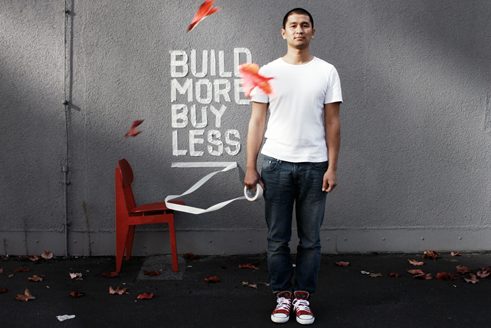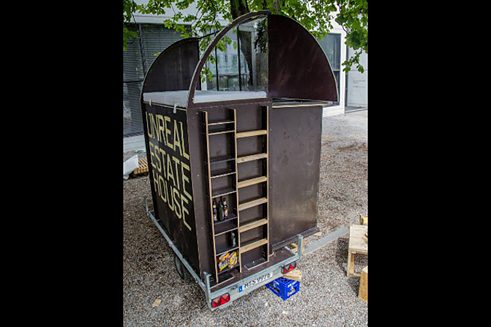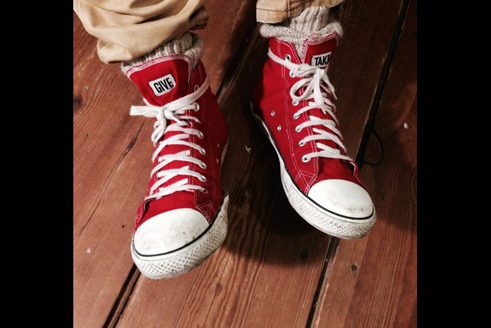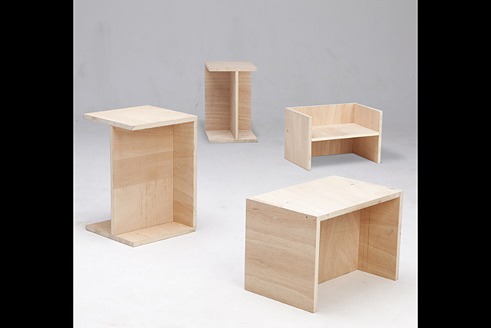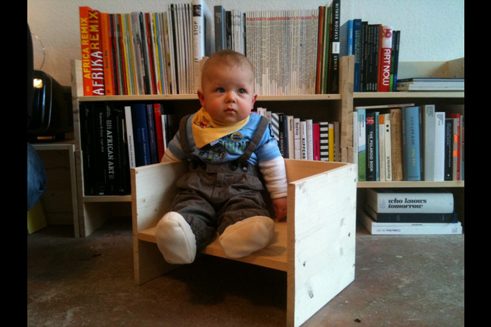Future Perfect
Get the Karma Started!
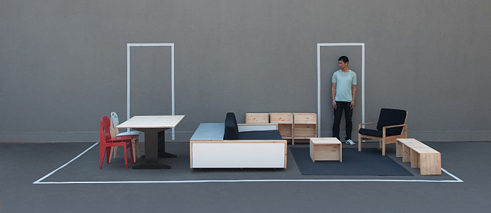
Van Bo Le-Mentzel is tackling the big question of what makes good entrepreneurship—and he is finding the answer in the Crowd.
Until recently, Andris was homeless, now he is living a life of luxury. His 5-square-metre house has a live-in, dine-in kitchen-bathroom as well as a bedroom with a window. The Unreal Estate House, in which he sleeps, eats, and reads, does not belong to Andris. Many people financed its construction; they all own it together. Van Bo Le-Mentzel likes that: not owning anything, sharing everything. He designed the Unreal Estate House and raised 3,000 euros in material costs via crowd-funding. Not for himself, but for the crowd, and at this particular moment for Andris, because the crowd wants him to be able to live there.
Fishing in the sea of ideas
Le-Mentzel is an architect-turned-furniture-designer as well as a keen critic of our type of economy. In the time it takes you to read this article, he will have fished at least three new projects out of the sea of ideas in his head. Le-Mentzel tweets and blogs, teaches workshops, holds presentations, and is constantly kicking off new projects.It all started with furniture in 2010. The young man had hardly any money, but he wanted to give his girlfriend a nice new shelf. So he took an adult education class in carpentry and built his first piece of wooden furniture. Soon thereafter, he designed his own pieces loosely based on the Bauhaus style, among them the Berlin Stool, which cost 10 euros in materials, and the cosy 24-Euro-Chair—furniture that anyone can afford and is therefore called Hartz IV Furniture after
the German welfare program for the long-term unemployed, Hartz IV. The designer posts instructions online for free, among them the building plan for the Unreal Estate House, the most sophisticated item so far.
A little bit happier, virtually and in reality
So far, about 50,000 established home improvers and new DIY aficionados have downloaded Le-Mentzel’s instructions from his blog. He estimates that a quarter of them live in precarious circumstances, just like he did when he first started his furniture project. Le-Mentzel does not care about money or copyright, as long as no one else tries to commercialize his ideas. All he wants is to make people a little happier when they build his designs: to get good karma flowing. He likes to observe how the items change through the work of others. He instantly sends the newest creations out into the crowd—a word he uses a lot.For Le-Mentzel, the crowd is key to a free way of living and working. The crowd meets in online networks and is in a constant state of flux. His crowd is now almost 22,000 strong: people who like his Facebook page Don’t consume, construct! and who share their ideas and support each other. Add to this about 1,000 Twitter followers and an email newsletter list of a few thousand. And the virtual crowd also works in real life: The Unreal Estate House is in Berlin only because someone took it there from Munich, where it had been built in front of the Pinakothek Modern Art Gallery-arranged online.
Responsibility in the crowd
It was also in cyberspace that Le-Mentzel found around 1,000 people who, like him, adore Chucks, the legendary basketball shoe. But the brand belongs to Nike, which by a long shot fails to meet Le-Mentzel’s standards for fair manufacturing. So he started producing shoes himself, using ecologically sound materials and paying a fair wage to the workers who make them. Via the crowd-funding website startnext, he found enough willing financial supporters of the Karma Chakhs, as he called his alternative model, as well as some people who lent their expertise to the endeavour: fair trade experts, people with connections to factories. That is why Le-Mentzel says he did not launch the production by himself: “The crowd did it.” And the crowd did well: two batches have already been shipped to fans of shoes, humanity, the environment, and the Internet. The third “harvest” is in the pipeline, and the shoe has recently been renamed Karma Classics – it’s already more legendary than the original.The Karma Classics come to those who want them free of any expectation of profit—but only with their help. Good enterprise brings good Karma, says Le-Mentzel. Money is only a means to an end. To him, the Karma Classics prove that the traditional value chain, which connects one beginning with one outcome, has outlived its purpose. Today, the consumer who used to wait at the end of the chain is involved in every step along the way, is part of the product history, and has to assume responsibility. At the moment, the karma community is taking some of the responsibility off Le-Mentzel’s shoulders: In the future, a Karma Association is to ensure the production and continuous improvement of the sneakers.
Good, free, and fair
With his various initiatives, Le-Mentzel is searching for answers to his 7 W’s—seven objectives that all happen to start with a W in German: free ways of dealing with knowledge, living spaces and the space in the clouds, warmth, water, well-being, and guidance. When asked what he has learned in the past two years, he immediately mentions three things: “First: The crowd is smarter than me. Second: Let the people you do something for get involved as well. And third: It’s okay to fail. The main thing is to get started in the first place.” The designer defines success as something that will let his little son’s future children live well in freedom and fairness—his very own concrete definition of "grand-child-ability."To achieve this, he has—of course—already launched a number of new ideas. The Crowd Book, for example, that anyone can use as a template to print books with a regular household printer, and the D-Scholarship, a group-financed basic income for full-time volunteers.
While Le-Mentzel is busy, Andris in his mini house might be turning on his Indie-Pendant Lamp, the latest piece of Hartz IV Furniture, and looking out over the softly glistening water. Both are good for karma. And that is what it is all about.
